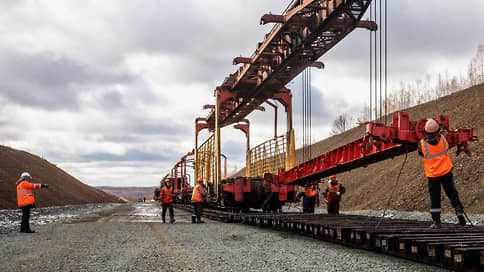Russian Railways is rallying contracts – Newspaper Kommersant No. 182 (7383) dated 03.10.2022
[ad_1]

Russian Railways sees potential risks for the Eastern Range expansion project due to the mobilization of contractors’ employees. The monopoly fears the loss of more than 60% of the workforce. According to experts, workers at the Eastern Test Site should be given reservations first of all among infrastructure projects, both to complete the work on time and as a measure to stimulate the influx of personnel to the facilities.
Russian Railways is concerned about the potential loss of personnel from contractors working at the Eastern training ground due to mobilization. This follows from the materials of Russian Railways for a meeting with First Deputy Prime Minister Andrei Belousov on September 29, a source familiar with their content told Kommersant.
Russian Railways notes that contractors receive notices about issuing subpoenas to employees involved in the construction of railway infrastructure. “First of all, they call on people with scarce professions (for example, machine operators, construction equipment drivers, electricians, bridge workers),” the monopoly notes. More than 940 summonses have already been handed over to employees of contracting organizations, more than 330 people have been mobilized. In addition, there is a trend of absenteeism of employees in connection with the announcement of mobilization. Russian Railways also notes that 12 regions have published orders prohibiting all persons liable for military service from leaving the region or city, including Dagestan, Tatarstan, Yakutia, North Ossetia, Amur, Voronezh, Kursk, Nizhny Novgorod, Samara, Smolensk, Chelyabinsk and Tver regions. Earlier, the Sverdlovsk region was also on this list, but it allowed the movement of those liable for military service.
According to preliminary estimates of Russian Railways, according to the materials, contractors may lose more than 60% of their workforce, “in particular, highly qualified personnel, with no possibility of replenishing labor resources.”
Monopoly asks for assistance in providing employees of contracting organizations with armor in order to avoid disruption of construction sites. The secretariat of Andrey Belousov declined to comment, the secretariat of Deputy Prime Minister Marat Khusnullin, who oversees the construction, does not comment on the mobilization.
In total, as previously reported by Russian Railways, 13.5 thousand people are now working at the Eastern training ground. However, the need for personnel will increase markedly, says the interlocutor of Kommersant, and already in 2023 it will amount to 30 thousand workers.
Also, 1.8 thousand military railway workers work at BAM, and an increase in the number of staff of railway troops for the needs of the Eastern training ground is being considered (see Kommersant of September 5).
Russian President Vladimir Putin, within the framework of the WEF, stated that the refusal to expand the BAM and the Trans-Siberian was a mistake. The contractors working at the Eastern test site and interviewed by Kommersant did not give any comments.
The head of Infoline-Analytics, Mikhail Burmistrov, notes that the priority goal of partial mobilization should be to attract those contractors who terminated their contracts ahead of schedule after February 24, representatives of law enforcement agencies, private security companies. In this regard, an attempt to solve the problems of a shortage of forces in the army by mobilizing employees of large enterprises and construction workers on large infrastructure projects is at least a mistake. And in the case of the Eastern test site, such actions generally look like a sabotage against export-oriented sectors of the economy, because if construction slows down, then, taking into account a new round of tightening sanctions, there will be risks of stopping production, including continuously operating ones. Now the reservation for builders at the Eastern Range, he believes, is not only a necessary element to maintain at least the current pace of commissioning of facilities, but also a mechanism for attracting personnel, which is still not enough to speed up the project, given the growing demand of exporters for transportation capacity in the east .
[ad_2]
Source link





